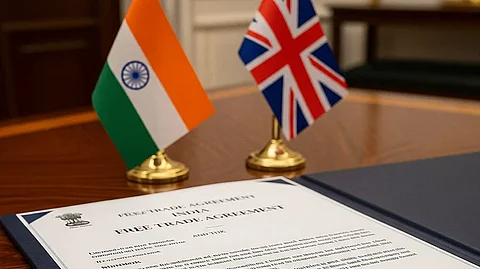
- Home
- Live Blog
- Breaking News
- Top Headlines
- Cities
- NE News
- Sentinel Media
- Sports
- Education
- Jobs

Prime Minister Narendra Modi’s recent two-day United Kingdom visit has turned out to be a historic one. The biggest outcome is that India and the UK have signed the Comprehensive Economic and Trade Agreement (CETA), which will raise the Comprehensive Strategic Partnership between the two countries to a new level. It will also enhance in a big way bilateral trade, investment, economic collaborations, and job creation in both economies. This FTA marks a significant milestone in India’s engagement with major developed economies and reflects a shared commitment to strengthening economic integration. As the world’s fourth- and sixth-largest economies, respectively, India and the UK’s bilateral engagement holds global economic significance. The bilateral trade between the two countries stands at nearly USD 56 billion, with a joint goal to double this figure by 2030. The agreement secures unprecedented duty-free access for 99% of India’s exports to the UK, covering nearly the entire trade basket. This is expected to open new opportunities for labour-intensive industries such as textiles, marine products, leather, footwear, sports goods, toys, and gems and jewellery, alongside fast-growing sectors like engineering goods, auto components, and organic chemicals. The services sector, a strong driver of India’s economy, will also benefit significantly. The agreement provides greater market access in IT and IT-enabled services, financial and legal services, professional and educational services, and digital trade. Indian professionals, including those deployed by companies to work in the UK across all service sectors and professionals deployed on contracts such as architects, engineers, chefs, yoga instructors, and musicians, will also benefit from simplified visa procedures and liberalised entry categories, making it easier for talent to work in the UK. The agreement marks a milestone in the trade relations between two major economies, setting an ambitious and balanced framework. It will also exempt Indian workers and their employers from UK social security contributions for three years, boosting competitiveness and earnings. More importantly, India has also secured an agreement on the Double Contribution Convention. This will exempt Indian professionals and their employers from social security payments in the UK for up to three years, improving the cost competitiveness of Indian talent. Moreover, the agreement has been designed to make trade more inclusive. Women and youth entrepreneurs, farmers, fishermen, startups, and MSMEs will gain new access to global value chains, supported by provisions that encourage innovation, promote sustainable practices, and reduce non-tariff barriers. Assam and the Northeast also stand to benefit from the agreement in a significant way, as Indian tea will get zero-duty access to the UK. The United Kingdom currently accounts for about 5.6 percent of India’s total tea export, and this figure is poised to grow steadily, especially after Modi shared a cup of tea with his UK counterpart, Keir Starmer, at Chequers. The tea they had was sourced from Assam and brewed with masala (spices) collected from Kerala. The viral moment came as the two leaders moved forward on the India–UK Free Trade Agreement, with both sides saying they’re brewing stronger ties.